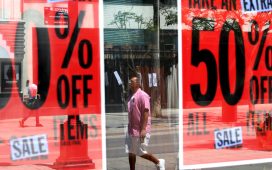Unlock the Editor’s Digest for free
Roula Khalaf, Editor of the FT, selects her favourite stories in this weekly newsletter.
UK retail bellwether Next has raised its annual profit forecast to nearly £1bn on the back of better than expected sales, defying malaise elsewhere on the high street due to poor weather.
The company lifted its pre-tax profit forecast for the year by £15mn on Thursday, to £995mn — an increase of 8.4 per cent on the previous year’s result.
Next had already upgraded its annual guidance to £980mn in August, from £960mn, in contrast to rivals including Primark, which recently warned that UK like-for-like sales would fall in its second half as bad weather hit demand.
Chief executive Lord Simon Wolfson said Next’s consistent performance over the years was due to the group’s “ability to weather the storm” and sell the right products across the right platforms, as well as its “rigorous financial discipline”.
The company is considered by retail analysts to have deftly adapted to the shift to online shopping and responded to global crises while many of its peers have disappeared from the high street.
The group, which has an established presence in the UK, has pinned some of its growth hopes on selling fashion overseas, with sales up 23 per cent during the first half of the year.
On Thursday, Next said it would launch a separate website for more premium and aspirational third-party brands as “a significant portion of our customers actively seek out premium and luxury products”.
The latest upgrade comes after full-price sales over the first six weeks of the second half beat expectations, rising by 6.9 per cent, following strong trading in the first half.
Over the six months to July, full-price sales were up 4.4 per cent, with pre-tax profits rising by 7.1 per cent to £452mn. Total group sales rose 8 per cent to £2.9bn.
The group’s shares rose 3 per cent in early trading, giving Next a market capitalisation of £13.4bn.
Clive Black, head of consumer research at Shore Capital, said: “Despite a challenging backdrop in the UK for consumer goods including apparel, [Next] has cleverly set expectations over a sustained period of time that means it at least meets and more often than not exceeds expectations.
“That sense of control, downside resilience, boosted by more often than not small beats, underpins the stock market’s move from affection to love for Next’s equity,” he added.









